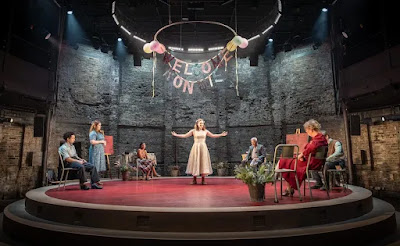Roots
The Almeida is running this Arnold Wesker play from 1958 about an angry young woman taking issue with the way her family has always done things, alongside a revival of Look Back in Anger about the quintessential angry young man*.
Despite the sparse set, the play stakes its claim as a kitchen sink drama from the start. The first long scene is set in her sister's kitchen as Beatie returns home to Norfolk from London, full of opinions gleaned from her unseen boyfriend Ronnie. The play shows its age in the amount of words needed to establish the family relationships and something of Ronnie's character too, through Beatie's parroting of his insights. Ronnie is full of socialist ideals but is a bit disdainful of the working classes that he is so keen to lift up. Beatie though is clearly inspired by him and is able to quote full paragraphs of his words and opinions, nicely highlighted in the play by Beatie standing on a chair to opine/preach with a full spotlight on her whenever she gets into full flow. The family of a rural farming community are not at all interested in politics, art or culture and are perfectly satisfied in their stoicism, lack of ambition and with the minutiae of their daily lives, despite the way that they are exploited and let down by the society that is meant to be supporting them. All of which is very frustrating to Beatie and presumably to Ronnie too. Ronnie is due to visit, but like Godot, is destined never to arrive, although Beatie does at least get a letter.
The performances of Morfydd Clark as Beatie and Sophie Stanton as her mother were particularly good, and any scene between them was buzzing with life. One strange thing that struck me was the accents - this family are from Norfolk and, it might just be me, but I kept getting an Australian twang from the whole cast which made me quite confused. It's a pretty talky play, but I gather that an hour has been edited out so that it ran at 1 hour and 45 minutes without an interval at this performance. It still felt quite long though, particularly in the first half which took a long time and lots of words to establish the characters and dynamic. I know I am particularly keen on brevity, but I think another half hour could be lost from the start without losing any of the impact.
I can see that this is an interesting time to revive this play, and it hit well for me in the final monologue from Beatie about how they are being distracted by third rate music and tv, and not interested in the important things of life 'We shut off our minds the minute anything unfamiliar appeared'. That easily lands as a complaint for today. It also works well as a play about a woman trying to break free from the constraints being placed on her. I sympathised with Beatie for that, and her striving for liberation, although it was interesting to see her dependence on a man to enlighten her.
It's clearly a period piece but as an example of the groundbreaking plays of the late 50’s, and the precursor of the soap opera, it worked well. And it did a great job in highlighting how attitudes and expectations towards women, and sexuality have changed, in some ways anyway. But if the men might not get away with quite so much unchallenged now, and women would probably have more sense of their own autonomy, given the rise of the far right across the western world, maybe we still aren't far enough away from this 1950s world after all. And it also depressingly highlighted how the political and cultural landscape around class has stayed pretty much the same.
Finally, I do have audience behaviour to comment on again… Just as the play began to get me properly interested the man behind decided to scrabble through every pocket in his nylon bag for what felt like a couple of minutes; every time I thought he had stopped, he clearly found another pocket to try. Then silence reigned for maybe thirty seconds before we realised what he had been searching for as the loud smacking of lips and sucking of boiled sweets next echoed in our ears .... he definitely took his time enjoying that sweet!
*Even though I can appreciate the groundbreaking nature of Look Back in Anger, I dislike Jimmy far too much to be able to sit through that play again (so much toxic masculinity!)

Comments
Post a Comment